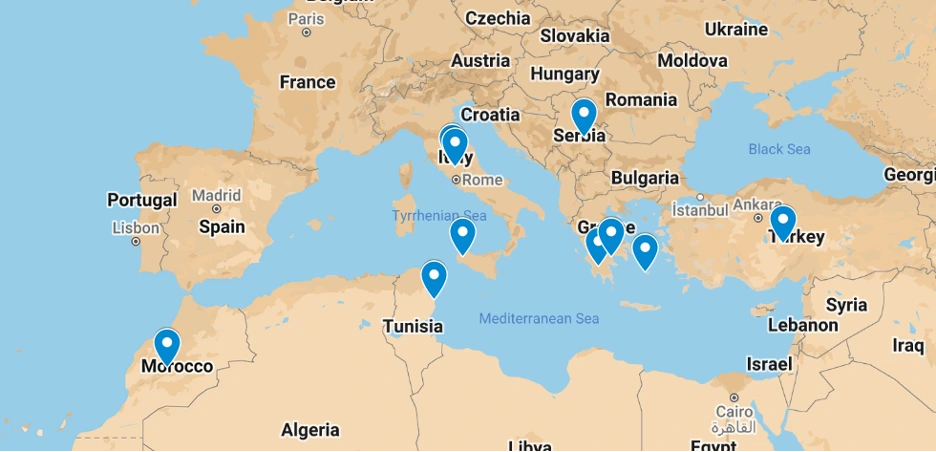
Location markers on map indicate locations where faculty in the Ph.D. Concentration in the Archaeology of the Mediterranean World are currently researching.
The Archaeology of the Mediterranean World is a concentration within the Ph.D. in Anthropology (Major in Archaeology) at the School of Anthropology that focuses on the material remains of the cultures of the Mediterranean basin and littoral, situating these peoples within their broader cultural and ecological contexts.
The students in this concentration have the same requirements as all Ph.D. students in Anthropology (Major in Archaeology) with the additional requirement of one ancient language to proficiency at the graduate level.
About the Concentration
The University of Arizona offers a unique graduate program with an unusually broad spectrum of courses and faculty from a variety of disciplines. The regional foci of the current faculty and their active excavation and cultural heritage projects in this concentration include
- Italian, Greek, and Cypriot prehistory
- Greece in the first millennium BCE (Mt Lykaion Excavation and Survey, Parhassian Heritage Park of the Peloponnesos)
- Early Italy and the Roman Empire (Arizona in Sicily Project; Lugnano at Teverina; Crocefisso Etruscan Cemetery and Campo della Fiore at Orvieto)
- Morocco, Serbia Turkey, and the Levant in the Paleolithic period as well as during the second and first millennia B.C. (Bismoune Cave, Velica Pecina, Aşıklı Höyük)
In addition, students can receive training in scientific applications in archaeology at School of Anthropology laboratories, such as the Archaeological Mapping Lab, the Laboratory for Traditional Technology, the Microscopy Lab, Zooarchaeology and Lithics Laboratory. Some studies study in other laboratories and interdisciplinary centers on campus, such as the Center for Mediterranean Archaeology and the Environment and the Laboratory for Tree Ring Research, as well as training in museum collections research at the Arizona State Museum.
In addition to a rich curriculum offered by Anthropology faculty, students have regularly developed ties through research and coursework with faculty at Classics, Geography, History, and Art History.
The students in this program have conducted their dissertation research with prestigious fellowships at research centers overseas, such as the American Academy in Rome and the American School of Classical Studies at Athens. Others have been successful in securing generous generous internal and external funding, such as P.E.O.
The Archaeology of the Mediterranean World contributes to a vibrant community of Anthropology faculty across all divisions at the School of Anthropology whose work focuses on ancient and modern Mediterranean promoting the Mediterranean Studies, as one of the core program strengths of the School.
Faculty
Core Faculty at the School of Anthropology
Affiliated with the School of Anthropology
- Beth Alpert Nakhai (Judaic Studies)
- Charlotte Pearson (Laboratory for Tree Ring Research)
Currently Enrolled Students
Recent Graduates
2021. Martin, Stephanie. Migrations and Crisis in the Mediterranean: An Anthropological Dialogue on Past and Present Migrations
2020. Moses, Victoria. The Zooarchaeology of Early Rome: Meat Production, Distribution, and Consumption in Public and Private Spaces (9th-5th cent. BCE)
2020. Phelps, Daniella. Intentionally Forgetting: An Anthropological Examination of the Burial of Tutankhamun in the Valley of the Kings, Egypt
2020. Winter, Matthew. Navigating the Built Environment: Architecture and Social Connectedness in the Southern Levant, 330 BCE - 250 CE
2019. Rodríguez-Álvarez, Emilio. Forming Identities: Technological Choices and Potters in Archaic Corinth

